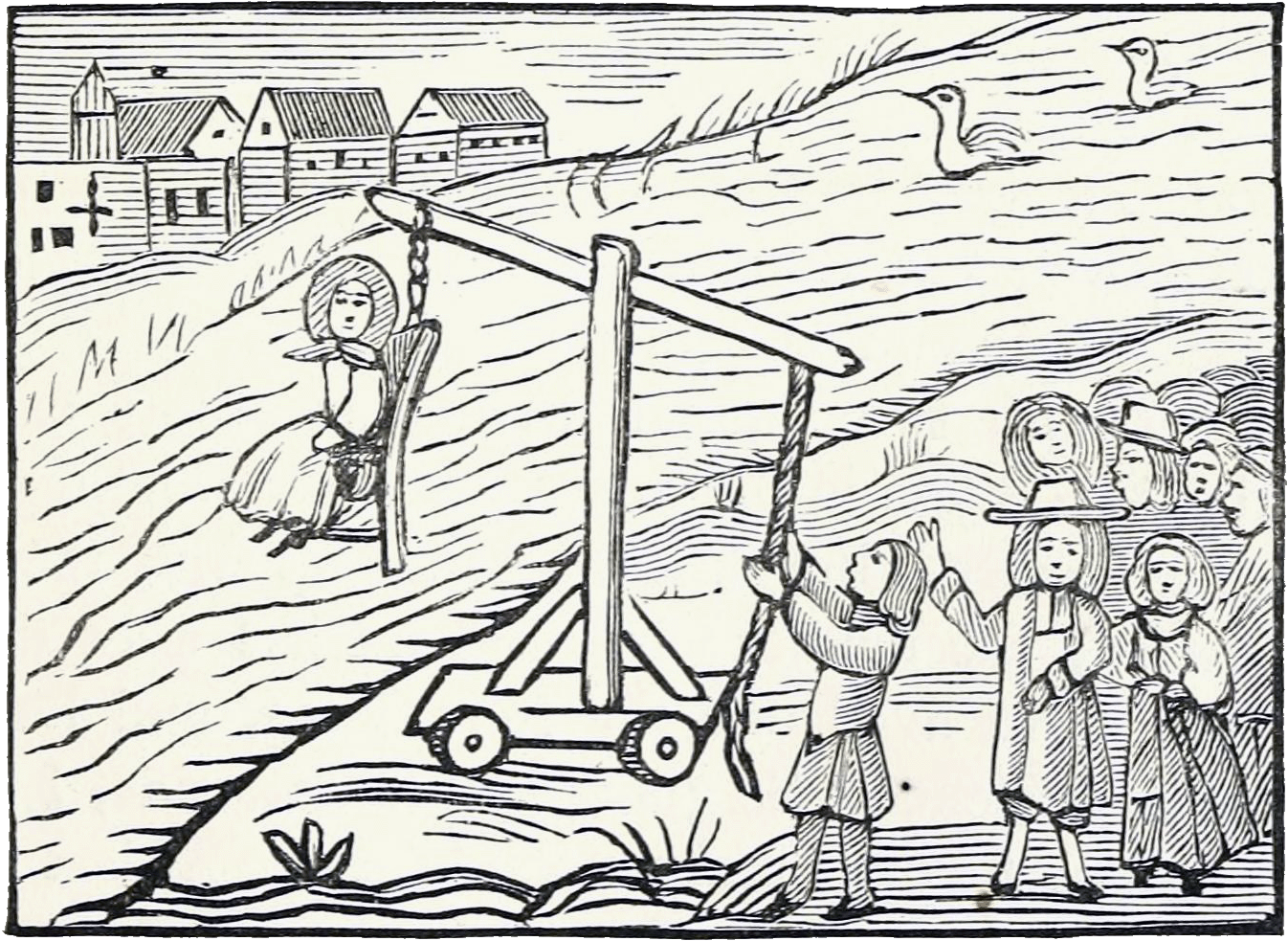 aaa
aaa
Former Castle & Prison Guide Becca Colmer investigates the unpleasant history of the ducking stool.
Who hasn’t committed the gristly details of England’s witch trials to heart: “if they floated they were guilty and if they sank they were innocent”..
For many, the ducking stool is inextricably linked with stories of witchcraft. But this was not the only crime that could result in ducking. Far from being reserved for a few unfortunate enough to be believed to have supernatural sympathies, ducking was a humiliation that any 16th or 17th century Oxford woman could find themselves subject to. Indeed, only one instance of a woman being formally charged with witchcraft in Oxford is recorded. Far from it causing a furor, it was almost immediately dismissed as being part of a bigger cycle of accusations and counter-accusations between two quarrelling Oxford women, Joan Egby and Dorothy Rodgers[1]).
Originally intended to punish dishonest merchants in Saxon England by securing them in one place and pelting them, by the 1300s, the cucking stool (originally ‘Cukken’ or Dung’ stool’) had become a wymen pine[2] or women’s punishment, and generally involved lowering the victim into bodies of water (which in turn led to the cucking stool becoming referred to as the ducking stool). In 1579, Oxford City purchased its own ‘cucking stool’ [3]– a chair attached to a long arm that could be used to lower the unfortunate sitter into any convenient river or pond. Originally moveable, to allow to punishment to be carried out wherever most convenient, in 1647 it was fixed at the Castle Mill[4]– presumably so the punishment of the ‘scold’ could be enacted in as public a spot as possible.
What exactly could label one a scold? Well, that’s more difficult to define: name-calling, flirting, arguing and talking too much could all be enough to land a woman upon the ducking stool[5]. And although not officially intended as a way for husbands to keep their wives in their place, it is undeniable that wives certainly came off the worst (unmarried or widowed women were far less likely to be labelled a ‘scold’.)
In the 1615 Oxford Quarter Sessions, Elizabeth Slyle and Kath Forrest were found guilty of ‘scolding’ and sentenced to being ‘well ducked’ by the Magistrate[6]. The 1615 ballad ‘The Cucking Of The Scold’ [7]describes the process the two women would have been subjected to with disarmingly upbeat rhyme:
Then was the Scold herself,
In a wheelbarrow brought,
Stripped naked to the smock,
As in that case she ought:
Neats tongues about her neck
Were hung in open show;
And thus unto the cucking stool
This famous scold did go
Then fast within the chair
She was most finely bound
Which made her scold excessively
And said she should be drowned
But every time that she
Was in the water dipped
The drums & trumpets sounded brave
For joy the people skipped.
By the 1700s, as England’s witch trials lessened, ducking stools had begun to fall out of fashion. Britain’s taste for more elaborate and theatrical punishments was beginning to wane and the last ducking stool was last rolled out in the Herefordshire town of Leominster in 1817. Fortunately for the intended victim Sarah Leeke, the water level in the pond intended for use had dropped to such an extent that the authorities, perhaps realizing that dabbling in ankle-deep water didn’t really count as ducking, made the sage decision to merely roll Sarah around the town on the stool seat instead[8].
In 1967 the punishment for ‘scolding’ was, rather belatedly, struck from the stature books of England and Wales[9], but although the practice has died out, our penchant for criticizing women for unwomanly verbosity has lingered. In 2008, Fox News attributed Hilary Clinton’s loss against Barack Obama to her ‘nagging voice’[10]; within a year of the #MeToo movement (the online campaign for women to share their experiences of sexual assault and harassment), The Telegraph[11] and The Guardian[12] were questioning whether it had ‘gone too far’; over the past few years, Tiktokker Andrew Tate has gained over 13 billion views for espousing his view that women should ‘shut the f*** up [and] have kids’[13]. Although on the plus side, at least, at the time of writing this blog post, no one seems to be advocating for ducking to be revived….
Author: Becca Colmer, 2023
[1] Oxford History Centre, Order Book, 1614-38
[2] Langland, William (1378). Piers Plowman.
[3] Oxford History Centre, Council Book A, 1528-92.
[4] Graham, Malcolm (2016). On Foot from Paradise Street to Sheepwash. Oxford Heritage Walks, 4. Oxford Preservation Trust.
[5] Jones, Karen (2016) Gender and Petty Crime in Late Medieval England: The Local Courts in Kent, 1460-1560. Boydell Press.
[6] Oxford History Centre, Council Book A, 1528-92.
[7] Rollins, Hyder E (2019). A Pepysian Garland: Black-Letter Broadside Ballads of the Years 1595-1639. Forgotten Books.
[8] Dickens, Charles (1882). All The Year Round. Dickens.
[9] Criminal Law Act, 1967.
[10] Fox News’ Your World With Neil Cavuto (January 2008)
[11] Cohen, Claire. The Telegraph (June 2018) War Of the Words: Has #MeToo Gone Too Far?
[12] Kipnis, Laura. The Guardian (January 2018) Has #MeToo Gone Too Far Or Not Far Enough?
[13] Das, Shanti. The Guardian (August 2022) Inside the violent, misogynistic world of TikTok’s new star, Andrew Tate


| Cookie | Duration | Description |
|---|---|---|
| cookielawinfo-checkbox-advertisement | 1 year | Set by the GDPR Cookie Consent plugin, this cookie is used to record the user consent for the cookies in the "Advertisement" category . |
| cookielawinfo-checkbox-analytics | 11 months | This cookie is set by GDPR Cookie Consent plugin. The cookie is used to store the user consent for the cookies in the category "Analytics". |
| cookielawinfo-checkbox-functional | 11 months | The cookie is set by GDPR cookie consent to record the user consent for the cookies in the category "Functional". |
| cookielawinfo-checkbox-necessary | 11 months | This cookie is set by GDPR Cookie Consent plugin. The cookies is used to store the user consent for the cookies in the category "Necessary". |
| cookielawinfo-checkbox-others | 11 months | This cookie is set by GDPR Cookie Consent plugin. The cookie is used to store the user consent for the cookies in the category "Other. |
| cookielawinfo-checkbox-performance | 11 months | This cookie is set by GDPR Cookie Consent plugin. The cookie is used to store the user consent for the cookies in the category "Performance". |
| PHPSESSID | session | This cookie is native to PHP applications. The cookie is used to store and identify a users' unique session ID for the purpose of managing user session on the website. The cookie is a session cookies and is deleted when all the browser windows are closed. |
| viewed_cookie_policy | 11 months | The cookie is set by the GDPR Cookie Consent plugin and is used to store whether or not user has consented to the use of cookies. It does not store any personal data. |
| Cookie | Duration | Description |
|---|---|---|
| _ga | 2 years | The _ga cookie, installed by Google Analytics, calculates visitor, session and campaign data and also keeps track of site usage for the site's analytics report. The cookie stores information anonymously and assigns a randomly generated number to recognize unique visitors. |
| _gat_UA-9822230-4 | 1 minute | A variation of the _gat cookie set by Google Analytics and Google Tag Manager to allow website owners to track visitor behaviour and measure site performance. The pattern element in the name contains the unique identity number of the account or website it relates to. |
| _gcl_au | 3 months | Provided by Google Tag Manager to experiment advertisement efficiency of websites using their services. |
| _gid | 1 day | Installed by Google Analytics, _gid cookie stores information on how visitors use a website, while also creating an analytics report of the website's performance. Some of the data that are collected include the number of visitors, their source, and the pages they visit anonymously. |
| CONSENT | 2 years | YouTube sets this cookie via embedded youtube-videos and registers anonymous statistical data. |
| Cookie | Duration | Description |
|---|---|---|
| _fbp | 3 months | This cookie is set by Facebook to display advertisements when either on Facebook or on a digital platform powered by Facebook advertising, after visiting the website. |
| fr | 3 months | Facebook sets this cookie to show relevant advertisements to users by tracking user behaviour across the web, on sites that have Facebook pixel or Facebook social plugin. |
| test_cookie | 15 minutes | The test_cookie is set by doubleclick.net and is used to determine if the user's browser supports cookies. |
| VISITOR_INFO1_LIVE | 5 months 27 days | A cookie set by YouTube to measure bandwidth that determines whether the user gets the new or old player interface. |
| YSC | session | YSC cookie is set by Youtube and is used to track the views of embedded videos on Youtube pages. |
| yt-remote-connected-devices | never | YouTube sets this cookie to store the video preferences of the user using embedded YouTube video. |
| yt-remote-device-id | never | YouTube sets this cookie to store the video preferences of the user using embedded YouTube video. |